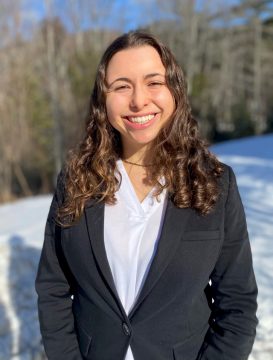In a presentation to the Geisel Medical Student Grand Rounds, Rebekah Davis MPH ’22 demonstrated how she put into practice research skills she learned while pursuing a Master of Public Health at The Dartmouth Institute for Health Policy and Clinical Practice at Geisel School of Medicine to see whether a program created to bridge a disconnect between patient care and clinician-led innovation had a lasting effect.
Davis devised a qualitative research project—qualitative research involves collecting and analyzing non-numerical data to understand concepts, opinions, or experiences—to see whether alumni of the program carried forward what they learned.
A research assistant at The Magic Wand Initiative® (MWI)—a 10-month academic course at Massachusetts General Hospital focused on educating clinicians to become leaders in biomedical innovation. While physicians have a deep understanding of the problems affecting patient care, and a desire to solve them, they have neither the resources, time, nor the training to embark on clinician-led innovation.

The course bridges that disconnect through both on-site and virtual workshops—connecting program participants with prominent clinicians working in problem-based innovation to brainstorm problems and solutions along with didactic sessions such as learning effective presentation skills, how to pitch a problem, design thinking, refining a solution, and commercializing a product.
“Working together in groups on problem-based innovation, the fellows, many of whom were dermatology residents, pitched their ideas to leaders in the field of dermatology at the end of the program,” Davis explains.
Limiting her research to the virtual curriculum (because of the pandemic), Davis says her findings reaffirmed the significance of the program—she interviewed a small sample of alumni who said the program had a positive impact on their lives and careers and who remain engaged in biomedical innovation. “It also changed their mindset, shifting the way they think of themselves and their work—lessening burnout, increasing their confidence as agents of change, and the value in being part of a network of like-minded individuals.”
The biggest take away, she found, was participants felt they gained the knowledge and confidence to be physician-entrepreneurs.
Of those Davis interviewed, several are working on innovative ideas, another took on a leadership role within a dermatology innovation network and is mentoring residents, one is serving as a medical consultant for a start-up, others co-founded a medical environmental nonprofit, spearhead a problem-solving initiative within their hospital system, or have started their own companies.
She says it was clear that program alumni also learned that the barriers to clinician-led innovation—time, training, and resources—are not insurmountable.
On a broader scale, Davis notes, medical school curriculums are beginning to offer students learning opportunities to think deeply about healthcare problems and to apply innovation principles. And professional organizations are creating networks for those interested in innovation. She admits that although all MWI participants she interviewed are dermatologists, the program has since been embraced by other specialties and has expanded to include general surgery, orthopedic surgery, ENT, and anesthesia at the hospital, as well internationally to engage European dermatologists in the process of innovation.
Overall, she says, talking with program alumni about their passion for innovation and the role it plays in their lives was rewarding, “I especially enjoyed learning how the program provided needed relief from physician burnout during the pandemic.”
Davis, who has an undergraduate degree in finance, will begin medical school this fall. “While I like the business aspect of medicine, I miss the personal interaction you get from being a doctor. Ultimately, I’d like to blend my business background with medical care either in nonprofit management or healthcare consulting.”
Davis says, “Presenting at the Medical Student Grand Rounds was a wonderful opportunity to share my research with fellow students at Geisel and I encourage other MPH students to use this forum to share their work as well."